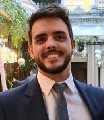Date: Thursday, 27 June 2024
Time: 09:00 - 10:00 CEST
Session code 1DV.1
Recovery of energy and nutrients from urban and industrial residues
Transforming Closed Landfills into Sustainable Energy Hubs: A Novel Approach for Environmental Remediation
Short Introductive summary
This research pioneers an innovative strategy to repurpose closed landfill areas, focusing on the Jóquei Clube de Brasília (JCB) controlled landfill in Brazil. The aim is to transform these sites into sustainable energy hubs by combining environmental management with hybrid energy solutions. By integrating electricity generation, landfill gas utilization, and solid waste incineration, this approach creates a sustainable energy system without requiring gas purification. Preliminary results showcase a 15% surplus in the energy balance, a significant reduction in leachate load, and an estimated annual decrease of 38.4-thousand-ton CO2eq emissions. This transformative initiative not only addresses environmental challenges but also exemplifies a path towards global sustainability, demonstrating the potential for closed landfills to become assets in generating renewable energy and fostering a sustainable society.
Presenter

Edgar A. SILVEIRA
University of Brasilia, Mechanical Engineering Dpt.
Presenter's biography
PhD in Mechanical Sciences from the University of Brasilia (UNB-Brazil) and in Fiber and Wood Sciences from the University of Lorraine (France). Professor at UNB, Silveira is engaged with biomass energy, waste management, thermochemical conversion technologies, heat transfer and energy systems.
Biographies and Short introductive summaries are supplied directly by presenters and are published here unedited
Co-authors:
L. Cunha, University of Brasilia, BRAZIL
E.A. Silveira, University of Brasilia, BRAZIL
A.C.P. Brasil, University of Brasilia, BRAZIL
Session reference: 1DV.1.8
